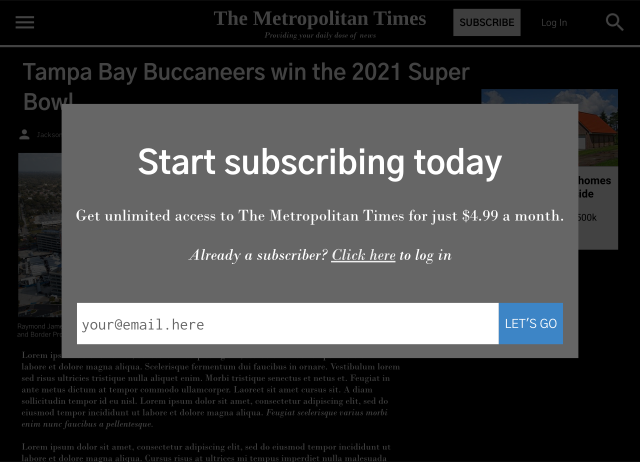Citizens in a democracy need reliable information to make good decisions, but what happens when that news is behind a paywall, while the outrage du jour is free?
The other day, a social media post about paywalls caught my attention. “Everytime I hit a paywall on some respected journalism site and then simply don’t read the article rather than subscribing, I think about how Fox, Breitbart, The Daily Mail, et al. never ever ever paywall their content,” the poster wrote. “I think about this constantly.”
Not long after, Justin King, the journalist YouTuber better known as Beau of the Fifth Column, discussed why he doesn’t put his content behind a paywall. A viewer wrote about being unable to figure out what, exactly, had happened to Paul Pelosi, since so many of the sites reporting about the incident required a subscription to continue reading, but he could only find “absolute bull” about the attack being reported on sites like Fox and InfoWars.
America, we have a problem!
Good quality, trustworthy journalism has a cost. It’s produced by people who do honest research, and who also like to eat a couple meals a day and keep a roof over their heads at the same time. There are multiple ways to accomplish this, and the subscription model is the most direct. You pay for content, and content is what you get.
Of course, not everyone prioritizes or can afford to pay for subscriptions to a wide variety of news sites, or perhaps any at all. Enter the ad-based sites, in which content appears to be free, because it is served up with a heaping helping of ads (above, below, alongside, popped up, popped under, and sometimes even blocking the content altogether). Unfortunately, these outlets at least a little beholden to the agenda of ad buyers. (Just ask Elon Musk how sponsors disappear when content moderation ceases being brand safe, for example.) In addition, this revenue model inverts who, exactly, is the customer, and what the product is.
If you’re looking at ad-supported content, your eyeballs (and headspace) are the product. Your attention is being sold to the ad buyers, who are the real paying customers. The content you’re reading is just the bait, used to draw you in. And because the website prospers through delivering as many ad impressions as possible, that bait doesn’t necessarily have to be factual. In fact, it may be better if it’s not, since strong emotion is what makes content go viral most reliably. Outrage, anxiety, and anger are just as valuable as awe, joy, or surprise, in this context. The more a piece is shared, the better.
That the ad-based revenue model is problematic has been known for years, but simple ad impressions aren’t worth very much per each. The real money is in targeted ads that take advantage of your personal data to direct your attention toward things you may actually buy are much more lucrative. This is the premise behind social media, a honeypot of freely given personal data that makes targeting you much easier. By 2016, the Cambridge Analytica scandal showed just how far the data-driven model could be taken.
In the recent midterm elections, however, the chickens of outrage have come home to roost. Constant repetition of the Big Lie – that the 2020 presidential election was stolen – generated the kind of outrage that underwrites worthwhile ad revenue, especially for sites that don’t hide behind a paywall. It can really motivate voter turnout, too, at least at first. In an interview with Alex Jones of InfoWars, however, Republican political consultant (and Nixon fanboy) Roger Stone opined that pushing the Big Lie so hard may have been behind the lack of a discernable “red wave” in the midterms. Tell people often enough that elections are rigged, and they’re not going to believe their vote counts anymore, so why bother? “Their attitude is that it’s broken and it cannot be fixed,” said Stone, “so I’m gonna go to my kid’s Little League Game [instead of voting].”

Now that constantly pushing the rage button has started to negatively affect even those whose fortunes have been tied for so long to providing free, news-flavored entertainment content, maybe, just maybe, something will change.
Beyond the paywall and ad-based revenue models, however, what is the best way to make sure that people can access the reliable information they need in order to be good citizens in a democracy, while also allowing media outlets to keep the lights on and providing journalists with a sufficient number of sandwiches to keep body and soul together? Ay, there’s the rub.
There’s the government-backed “state media” model, of course. That government mouthpieces are not always the best source of unbiased information should be self-evident. It’s one of the best reasons for the freedom of the press, as enshrined in the First Amendment.
When for-profit newsrooms were closing in droves in recent years, the solution was supposed to be found in amateur reporters, perhaps bloggers. There is value in peer-to-peer communication, but it’s also iffy. Random bloggers may lack journalistic integrity, not have all the information one needs to provide the full picture, or have unclear motivations. Plus, it’s hard to be a full time investigative journalist on top of another full time job.
Then there are donation-based and Patreon-sponsored outlets. This includes hybrid models that allows those with the means (and therefore the responsibility) to pay for news and interpretive commentary, but which don’t hide behind a paywall, so that those who can’t afford to pay can also access content. This works for some, especially for those who have a sufficiently large and generous viewer base. It’s not a possibility for new content creators who rely on a paywall in order to keep themselves housed and fed, though, and all too often, those without means are the voices we need to hear the most.
In the end, journalists and news outlets need revenue to keep working and providing reliable content. Citizens in a democracy need good information to make solid decisions, but may not be able to afford subscriptions. If reliable, well-researched information is too often sequestered behind a paywall while manipulative or deceptive content is free to view, more people will be ill-informed. It’s a fragile system prone to manipulation and failure, yet absolutely necessary to the proper functioning of the country. What a predicament!
Related: After Cambridge Analytica, is Social Media a Social Disease?
Editor’s note: In order to preserve our ability to provide helpful, consumer-focused content, Legal Reader does not sell advertising space to corporate interests. Similar to Patreon-supported sources, we depend on a private, non-corporate sponsor.


Join the conversation!